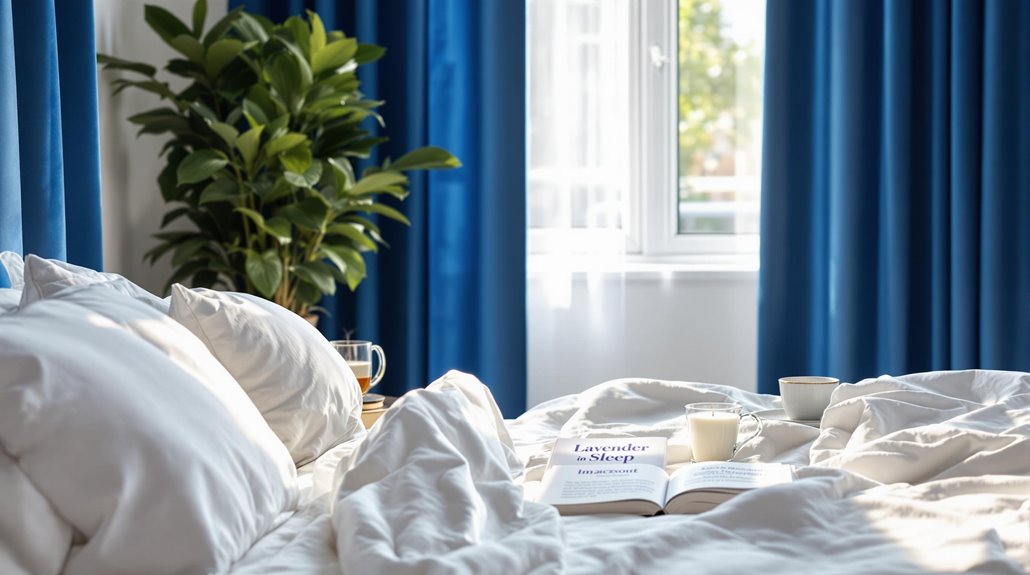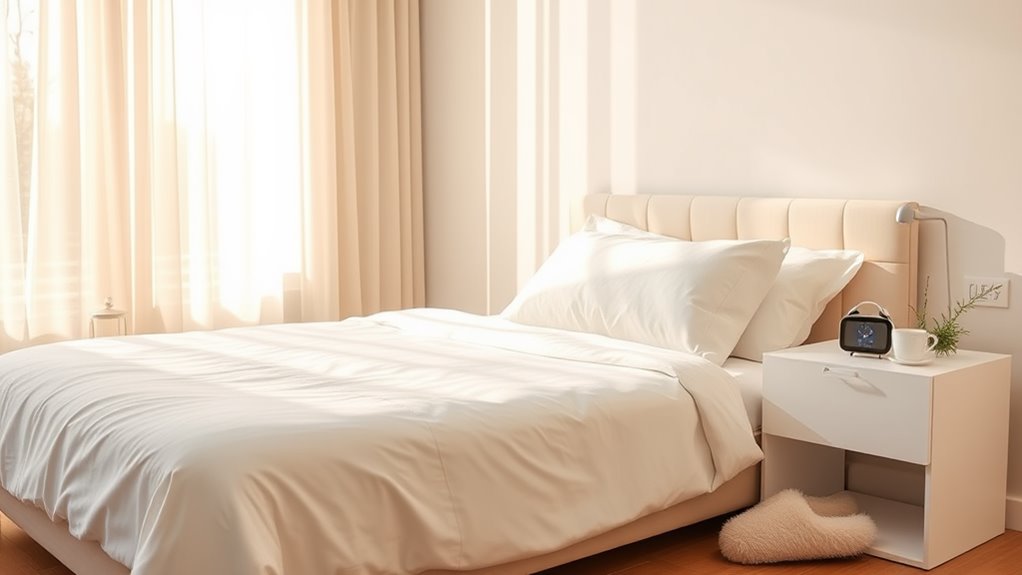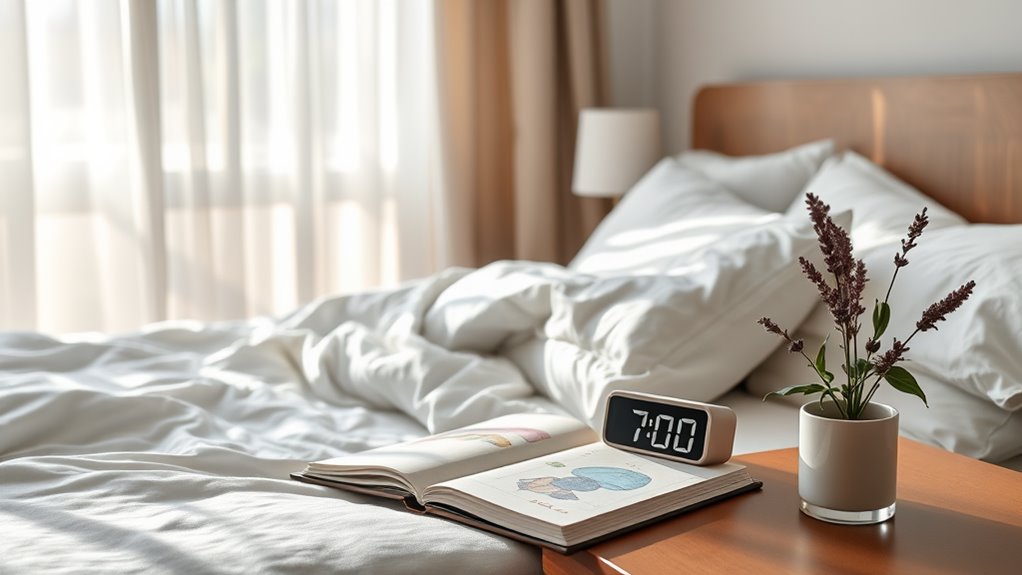
To boost productivity, tackle poor sleep habits by focusing on sleep hygiene and environment. Make sure your bedroom is quiet, dark, cool, and free of electronics. Stick to consistent sleep and wake times to help your internal clock. Poor sleep impairs memory, decision-making, and mood, leading to errors and increased stress. Quality sleep fosters muscle recovery, immune strength, and cognitive function, enhancing focus and creativity. Address these habits to prevent the economic strain of decreased job security and the health risks linked to sleep deprivation. There’s much more to uncover about the power of restful nights on your daily productivity journey.
Understanding Sleep Hygiene
In understanding sleep hygiene, it’s crucial to grasp that it involves both the environment you sleep in and the habits you maintain daily. These elements can set you free from restlessness, leading to improved well-being. Your sleep environment plays a pivotal role; make your bedroom a sanctuary—quiet, dark, and comfortably cool. A clutter-free and soothing space can release your body’s natural rhythms, allowing you to slip easily into peaceful slumber. Engaging in mindfulness practices before sleep can further enhance relaxation, steering you away from anxiety and tension. Furthermore, your bedtime routines have the power to either chain you to sleepless nights or liberate you into restful sleep. Consistency is key. By sticking to regular sleep and wake times, you align with your internal clock. Free yourself from life’s digital distractions by limiting electronic use close to bedtime. Instead, indulge in calming pre-sleep rituals like meditation or journaling, letting tranquility wash over you. Good sleep hygiene is associated with improvements in overall sleep quality, contributing to better health and well-being. Break free from habits that confine you to restless nights. Reserve your bed strictly for sleep, freeing yourself from the urge to work or watch TV there. Avoid caffeine or alcohol as evening companions, and skip late-day naps. With these mindful practices, you can reclaim your nights and supercharge your days with newfound energy and focus.
Effects of Sleep Deprivation
As you embrace good sleep hygiene, it’s important to recognize the significant consequences of sleep deprivation. Skimping on sleep can leave your memory retention and decision-making abilities in shambles. You might find it hard to concentrate or remember things, stumbling through your day in a fog. Trying to juggle tasks? Good luck. Your alertness takes a hit, increasing the risk of mistakes and making multitasking feel like an Olympic sport. Exercise can enhance cognitive function and memory, which are often compromised by lack of sleep. Plus, sleep deprivation can wreak havoc on your mood, making you irritable, frustrated, or more prone to anxiety and depression. When you’re sleep deprived, emotional regulation becomes a challenge. Change feels overwhelming, and you might struggle to keep your emotions in check. Severe lack of sleep can even lead to hallucinations and delusions—a far cry from the clarity and liberation you seek. In addition, chronically insufficient sleep plays a role in potentially increasing your risk of several health complications, including heart issues and mental health disorders. Daytime sleepiness? It’s a constant companion, sapping your energy and putting a damper on life’s pleasures. You’re more likely to have accidents, and social interactions may suffer due to mood swings.
Physical Health and Productivity

You’re likely aware that quality sleep is essential for recovery and maintaining energy levels crucial for productivity. When you rest well, your body repairs itself and boosts your mental and physical performance for the upcoming tasks. Maintaining a consistent sleep schedule can prevent sleep debt and align your sleep with natural rhythms, enhancing overall productivity.
Sleep’s Impact on Recovery
Have you ever considered how essential sleep is to your body’s recovery and overall productivity? It’s not just about feeling rested—the benefits reach far deeper.
During sleep, especially deep sleep, your body engages in important muscle recovery and maintains hormonal balance. Growth hormone, released during non-REM sleep, aids muscle repair, strengthening, and even building up your fitness levels.
When you’re deprived of sleep, this whole process gets disrupted, throwing your hormonal balances like IGF-1 and cortisol off-kilter, increasing inflammation and adversely impacting muscle recovery.
Evaluating sleep’s impact on your recovery process reveals valuable insights:
- Hormonal and Inflammatory Responses: Total sleep deprivation boosts cortisol and IL-6 levels, increasing stress and inflammation that hinder muscle repair.
- Muscle Repair and Regeneration: Blood flow and oxygen delivery enhance during deeper sleep stages, essential for repairing and rebuilding muscle cells.
- Injury Recovery and Healing: Restful sleep reduces inflammation, accelerating injury recovery and minimizing further damage.
Understanding these aspects emphasizes the necessity of quality sleep. It liberates your body to recover fully, ensuring you wake up ready to conquer challenges, whether in the gym, at work, or in life.
Don’t neglect that important rest—it fuels your potential.
Sleep’s Role in Performance
Quality sleep is a cornerstone of both physical health and productivity, impacting every aspect of your daily performance. When you honor your sleep cycles, you release the shackles of fatigue and embrace an energized, healthier self.
A full night’s rest not only nurtures your cardiovascular health by giving your heart a chance to rest, but it also regulates your blood pressure. It empowers your immune system, enabling you to fend off infections and recover swiftly, reducing risks of chronic conditions like obesity and diabetes.
Optimal performance metrics in your life aren’t just about efficiency at work; they’re tied to your emotional and cognitive well-being. Quality sleep strengthens your mental and emotional resilience, reducing stress and enhancing mood, so you can connect meaningfully with others.
Without it, irritability and emotional instability can storm your mind, clouding judgment and staining relationships.
The liberation of a well-rested mind is profound. Sleep impacts your cognitive function, from decision-making to creative problem-solving. It’s your secret weapon for maintaining focus and swiftly maneuvering through complex tasks.
Emotional Well-being Impact
When you get enough sleep, you’ll notice a significant reduction in stress levels and more stable moods. This leads to better interactions with colleagues and the ability to handle stressful situations without overreacting. Improving sleep hygiene can further enhance your emotional regulation and stress resilience.
Sleep and Stress Levels
A significant connection exists between sleep and stress levels, impacting your emotional well-being. High stress can impair your sleep by making it harder to fall asleep and fragmenting the rest you do manage to get. This often triggers excessive thinking about responsibilities and disrupts your sleep patterns.
On the flip side, insufficient sleep further compounds stress, elevating cortisol levels and leading to difficulties in stress management. To regain control over this cycle, consider effective sleep techniques which focus on creating the perfect environment and routine for rest.
Understanding the intricate dance between sleep and stress enables you to boost your emotional resilience. Discover how addressing one can improve the other:
- Adequate Sleep: It reduces cortisol, helping your body balance its systems and tackle stress more effectively.
- Deep Sleep: High-quality sleep, especially the deep stages, aids emotional processing and reduces anxiety.
- Consistent Patterns: Regular sleep schedules and habits are vital in managing stress levels long-term.
Liberate yourself from this vicious cycle by prioritizing sleep as a tool for stress management. You’ll find peace, stability, and the freedom to face life’s challenges with renewed energy and clarity.
Mood Stability Benefits
With better sleep, your mood sees remarkable improvements thanks to restored energy and your body’s enhanced ability to regulate emotions. It’s liberating to experience true mood enhancement. When you consistently sleep well, you gain emotional resilience against stressors. Suddenly, life’s minor annoyances won’t feel like insurmountable obstacles. Instead, you’ll tackle them with a sense of calm and control.
Chronic lack of sleep, on the other hand, can make you feel weighed down by anxiety, depression, and irritability. Poor or insufficient sleep raises negative emotional responses and drastically reduces positive feelings. Imagine cutting through that fog of anger and frustration just by getting adequate rest. You wake up refreshed, less reactive and ready to embrace what comes your way.
Additionally, quality sleep helps in honing cognitive skills essential for emotional regulation. This guarantees your decisions are balanced, not driven by fleeting whims or oversights.
With consistent, restful sleep, perceiving the world accurately becomes second nature, allowing you to greet joyous moments with genuine enthusiasm. Prioritizing sleep guards against dipping into moods that could spiral into chronic health or mental disorders, leading to a brighter, more fulfilling life.
Cognitive Function and Creativity

The brain acts as a symphony conductor that relies on sleep to fine-tune cognitive function and creativity. When you skip those precious hours, cognitive flexibility and creative problem solving take a hit. Your mind’s ability to adapt and thrive in changing circumstances feels stifled.
Without proper rest, you find creative thoughts confined, unable to flow freely like they should. The music in your head seems to falter, struggling to find harmony amidst rigid thinking.
Consider these liberating truths about sleep:
- Memory Foundation: Sleep deprivation disrupts the consolidation of information into both short-term and long-term memories, making creative insights harder to achieve.
- Attention Melody: Poor sleep reduces your ability to focus on tasks requiring logical or imaginative reasoning. With increased fatigue, concentration fades, silencing the potential for inspired breakthroughs.
- Judgment Harmony: Insufficient sleep dulls the precision of decision-making, leading to choices clouded with confusion and hesitation.
Blue light from screens inhibits melatonin production, disrupting circadian rhythms and sleep quality, thus hindering cognitive performance.
To release your full creative and cognitive potential, value your sleep. Let those restful hours guide your thoughts like a well-tuned orchestra.
Nurturing your sleep habits sets you free, empowering your mind to dream, adapt, and create without boundaries.
Economic Consequences of Poor Sleep
As your brain acts as a conductor for creativity and cognitive function, sleep’s influence orchestrates more than just mental well-being; it reverberates through the economy as well.
Sleep economics shows that the US loses a staggering $411 billion annually, alongside 1.23 million working days, due to insufficient sleep. This productivity loss reflects not just in lost hours but in daily inefficiencies—each employee might cost their company $2,516 a year when tiredness strikes.
Worldwide, economies suffer, too—Japan, the UK, and Germany experience similar financial drains, proving the global resonance of this issue.
For a forward-thinking individual yearning for liberation from economic constraints and stagnation, understanding the price of poor sleep on productivity is essential.
Sleep disorders escalate health care costs by $94.9 billion annually in the US, coupled with higher mortality risks and diminished skill acquisition. These costs extend beyond the workplace, affecting your personal growth and market success.
Workplace accidents and absenteeism are more prevalent, shrinking your potential and financial gains. Even more, the societal impact ripples outwards, impacting job security and earning potential.
Realizing the economic domino effect of sleep deprivation empowers you to prioritize better sleeping habits.
Strategies for Better Sleep

Achieving restful sleep requires adopting practical strategies that can be easily integrated into your daily routine.
First, establishing a consistent sleep schedule is key. Go to bed and wake up at the same time each day, even on weekends. Align your bedtime with when you naturally feel tired to curb tossing and turning. This consistent sleep-wake cycle boosts sleep quality and sets you free to wake naturally without an alarm.
Next, craft a sleep environment that promotes relaxation and rest. Keep your bedroom quiet, dark, and cool—aim for around 68 degrees. Darken the space with blackout curtains or a sleep mask to block unwanted light, and consider earplugs to silence disturbances.
Here’s a powerful trio for happy sleep:
- Comfortable mattress and bedding: Provides essential support.
- Distraction-free surroundings: No electronic devices in the bedroom.
- White noise: Helps mask disruptive sounds.














